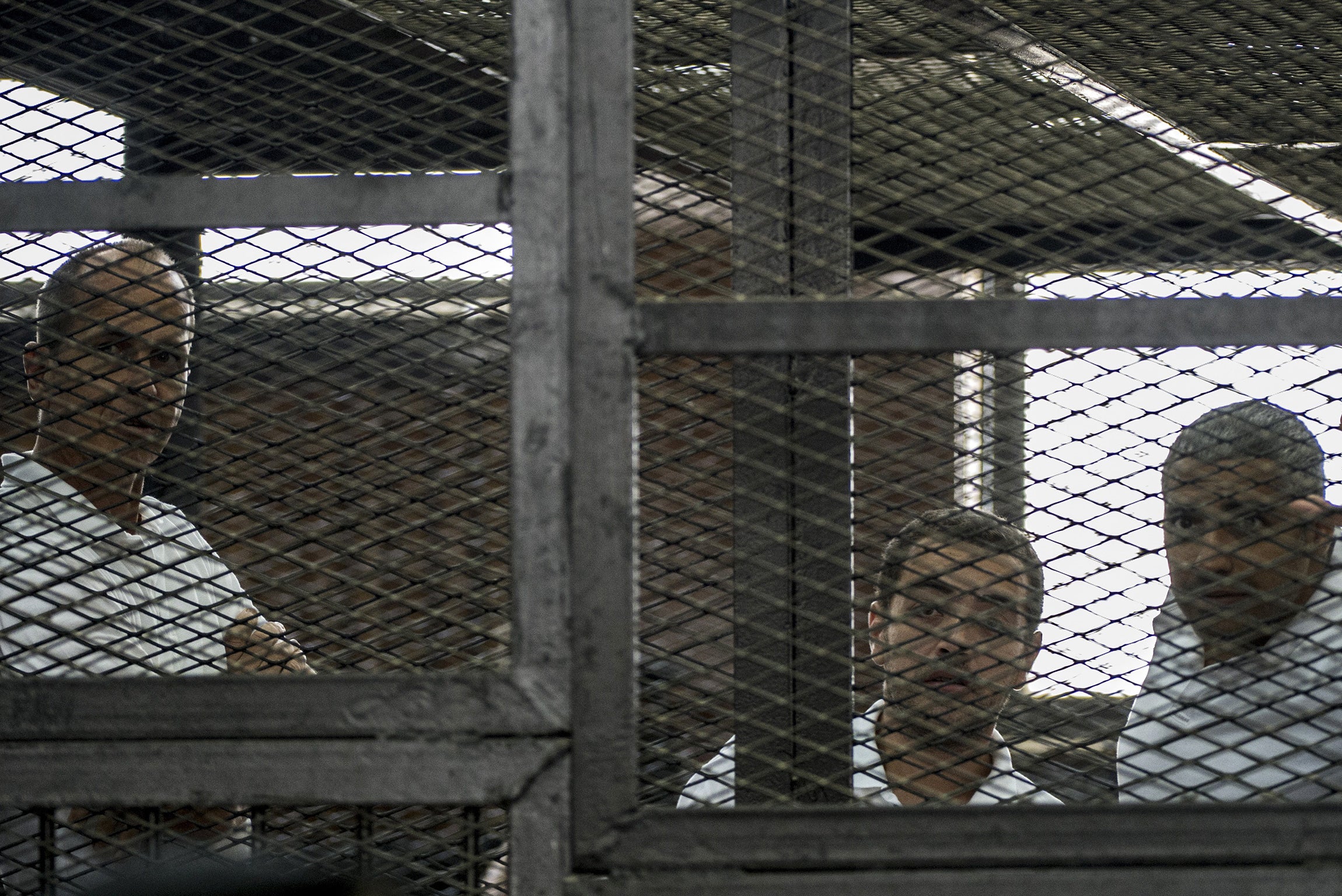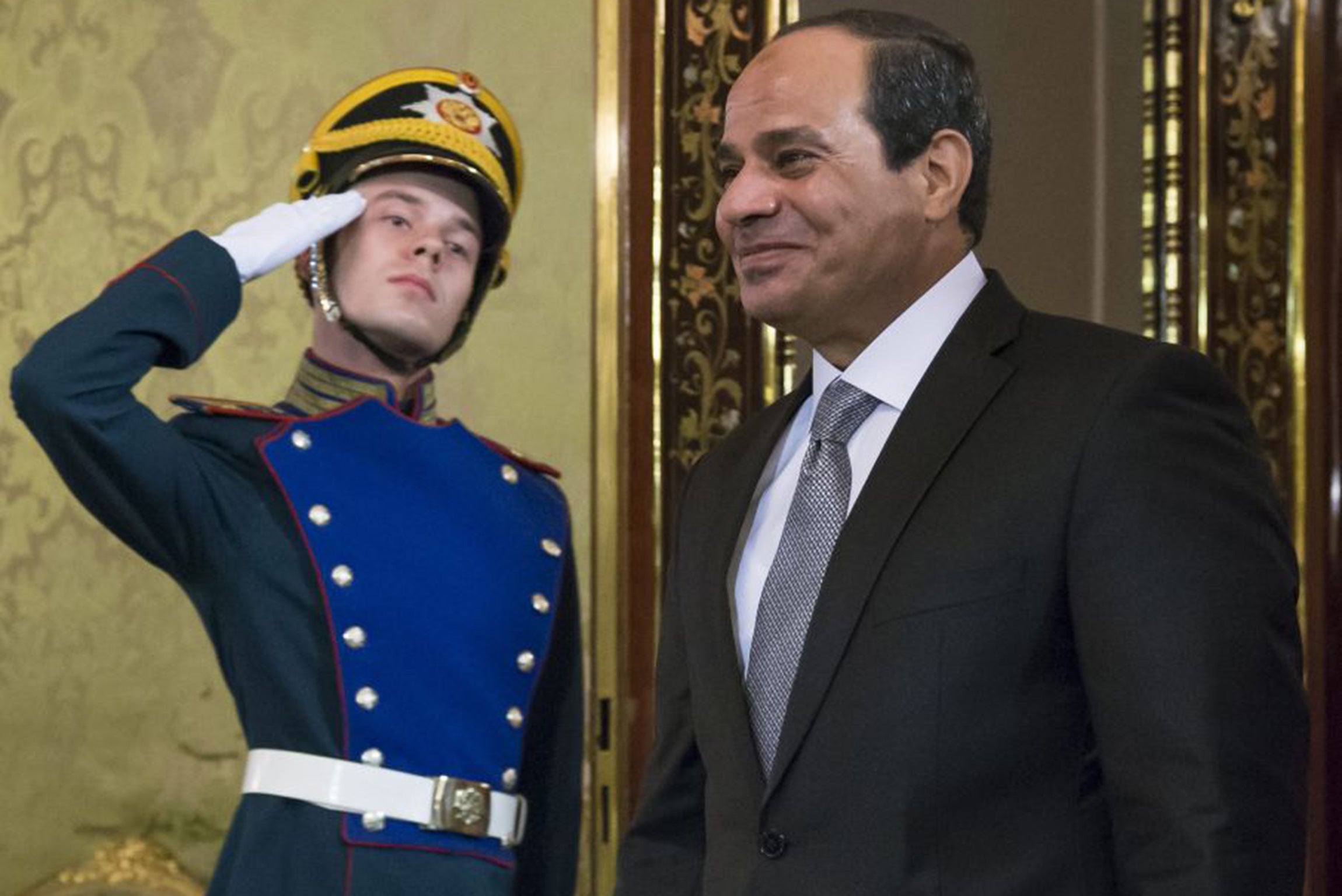Free, but the Al Jazeera three remain at the mercy of Egyptian President Sisi's 'justice'
Accused of spreading 'false news', defendants are kept in limbo on retrial verdict

Your support helps us to tell the story
From reproductive rights to climate change to Big Tech, The Independent is on the ground when the story is developing. Whether it's investigating the financials of Elon Musk's pro-Trump PAC or producing our latest documentary, 'The A Word', which shines a light on the American women fighting for reproductive rights, we know how important it is to parse out the facts from the messaging.
At such a critical moment in US history, we need reporters on the ground. Your donation allows us to keep sending journalists to speak to both sides of the story.
The Independent is trusted by Americans across the entire political spectrum. And unlike many other quality news outlets, we choose not to lock Americans out of our reporting and analysis with paywalls. We believe quality journalism should be available to everyone, paid for by those who can afford it.
Your support makes all the difference.Baher Mohamed likes to run, even in the clammy Egyptian heat that can easily exceed 40C in summer. When he and his dog, Gatsby, finally return to his family home in the Cairo suburb of Sheikh Zayed, they collapse, panting, on to the grass outside. “This is my only chance to process what might happen in future,” he explains.
Mr Mohamed, a TV producer, and his colleagues – the Australian Peter Greste and Egyptian-born Canadian Mohamed Fahmy – are three of up to 17 defendants awaiting sentencing in a trial known in Egypt as the “Marriott Cell case”, but more widely known as the Al Jazeera trial.
They are accused of spreading “false news” and aiding the Muslim Brotherhood – which was ousted from power in a military coup and is now classed as a terrorist organisation in Egypt. The three have spent more than a year behind bars following an initial trial labelled a “miscarriage of justice” by Human Rights Watch, and were released on bail in February to face a retrial.
The verdict on that retrial has already been delayed twice – most recently, Mr Mohamed is convinced, because the Egyptian President, Abdel Fattah el-Sisi, wanted to avoid bad publicity as he inaugurated the new Suez Canal channel on 6 August. “It’s all about Suez,” he says. Now a verdict is due to be delivered on Saturday – although there is still no guarantee.

Forcing the defendants to wait in limbo is a form of punishment in itself. Mr Fahmy recently accepted an academic post at a university in Canada, but cannot yet take it up.
Some of those accused have been caught up in the case despite having no connection to journalism. Shadi Ibrahim, one of three students on the charge sheet, pointed out that another – his friend Sohaib Saad – was snatched from a Cairo street by security forces during the retrial to face unknown further charges. “If we are released, it doesn’t mean there is freedom of speech in Egypt or that journalists can work here,” he said. “If I am released, it doesn’t make Egypt better. Each day is worse than the one before.”
Nor has being outside Egypt brought much relief from anxiety for Mr Greste, who was deported to Australia in February. “I’m frustrated, like all of us. It is incredibly difficult to keep going like this,” he said. “We are all exhausted by this, families and defendants, so to have the verdict constantly delayed has been infuriating. Even though we are physically out of prison, until we are exonerated of all charges, none of us will be free.”
Partly because of Egypt’s membership of Interpol, Mr Greste could – if found guilty – be prevented from travelling for fear of arrest at Egypt’s behest. The same fate befell another Al Jazeera journalist, Ahmed Mansour, when he was detained in Germany in June. He was later released, but the incident has cast a long shadow over the case.
In the 20 months since the initial arrest of the three Al Jazeera journalists, hostility towards the media – particularly the foreign press – has heightened in Egypt. There are new laws prohibiting reporting of “non-official narratives”, and many journalists remain behind bars. The Committee to Protect Journalists knows of at least 18 imprisoned in Egypt, the highest number since it began keeping records in 1990.
All of the defendants fear conviction and being handed another prison sentence on Saturday. Mr Mohamed is fond of saying that “every journalist is a press freedom activist”, but they are hoping that after a year and a half of fighting for their own freedom, they won’t be forced to campaign from behind bars once again.
Join our commenting forum
Join thought-provoking conversations, follow other Independent readers and see their replies
Comments